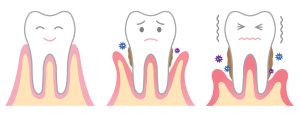 Periodontal disease is an infection that affects the surrounding tissues of the teeth. Also known as gum disease, it is caused by the buildup of plaque (a sticky film bacteria) and is the main cause of tooth loss in adults. It is difficult to know that you have it because it’s normally painless.
Periodontal disease is an infection that affects the surrounding tissues of the teeth. Also known as gum disease, it is caused by the buildup of plaque (a sticky film bacteria) and is the main cause of tooth loss in adults. It is difficult to know that you have it because it’s normally painless.
The beginning stage of periodontal disease is gingivitis. This can cause red, swollen gums that bleed easily. If developed during early childhood, gingivitis increases in occurrence and severity in the early teenage years.
Plaque turns into tartar or calculus (a rough, porous substance) if it is not removed carefully with daily brushing and flossing. The bacteria in the plaque produce toxins that inflame the gums. These toxins, when left in place, cause the gums to break away or disconnect from the teeth so periodontal pockets are formed allowing more toxins and bacteria within the pockets. The pockets become deeper as the disease progresses causing the plaque to move beyond, damaging the bone that keeps the tooth in place. This will cause the tooth to fall out or cause it to require extraction.
The Warning Signs
- red, swollen, tender gums
- gums that bleed easily
- gums that have moved farther from the teeth
- loose or separating of permanent teeth
- incessant bad breath
- discharge between the gum and tooth
- any changes in the fitting of partial dentures
- any change in the manner your teeth fit together when you bite
Factors that increase the risk of periodontal disease
- poor oral hygiene
- genetics
- smoking or chewing tobacco
- crooked teeth that are difficult to keep clean
- diabetes
- pregnancy
- breastfeeding
- medications and steroids, oral contraceptives, certain types of anti-epilepsy drugs, some calcium blockers, and cancer therapy drugs
It is important to see your dentist for any early signs of periodontal disease. The earlier it is treated, the better chance of stopping the disease. A professional cleaning by Dr. Voyles, followed by daily proper brushing and flossing can reverse periodontal disease.
